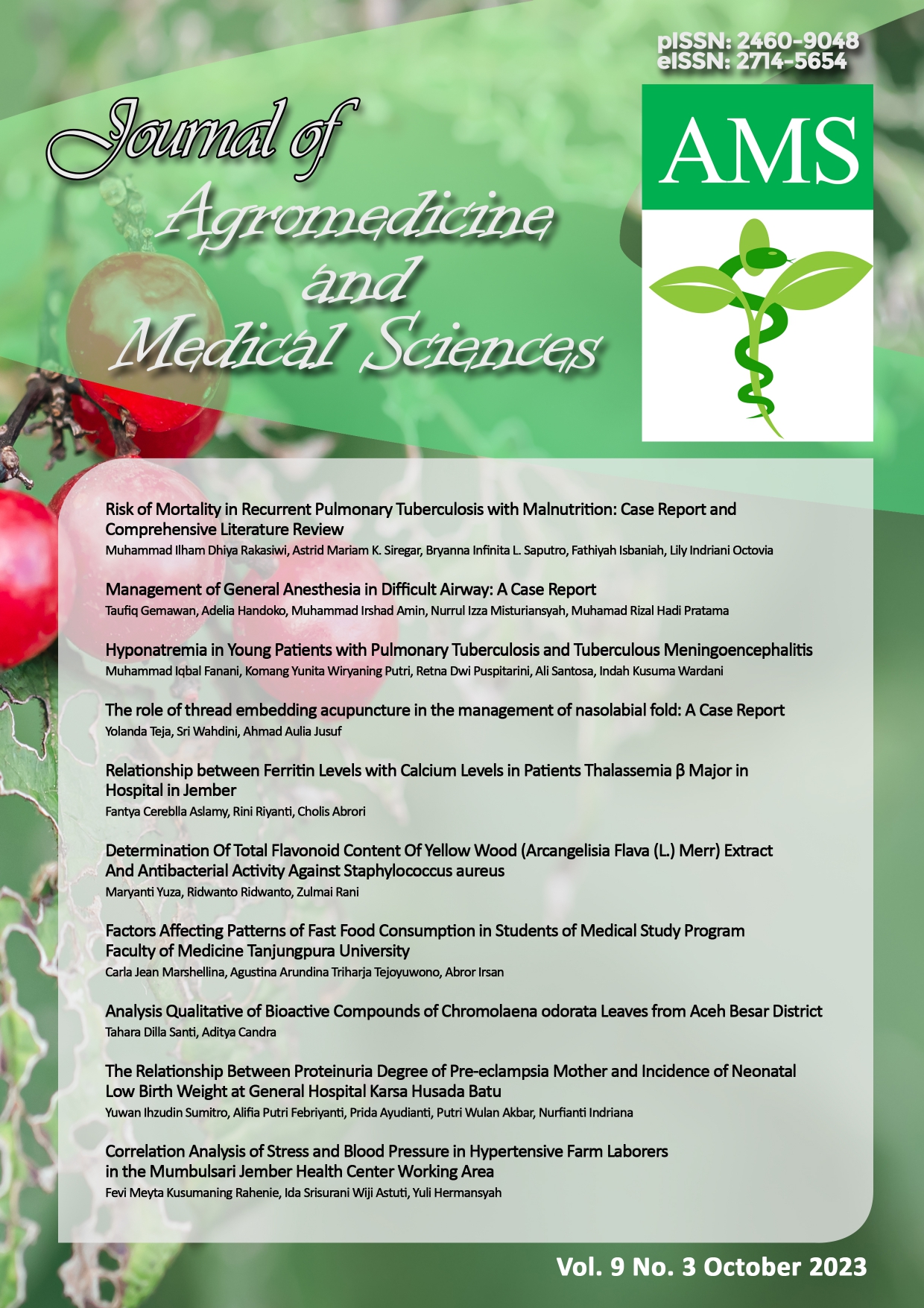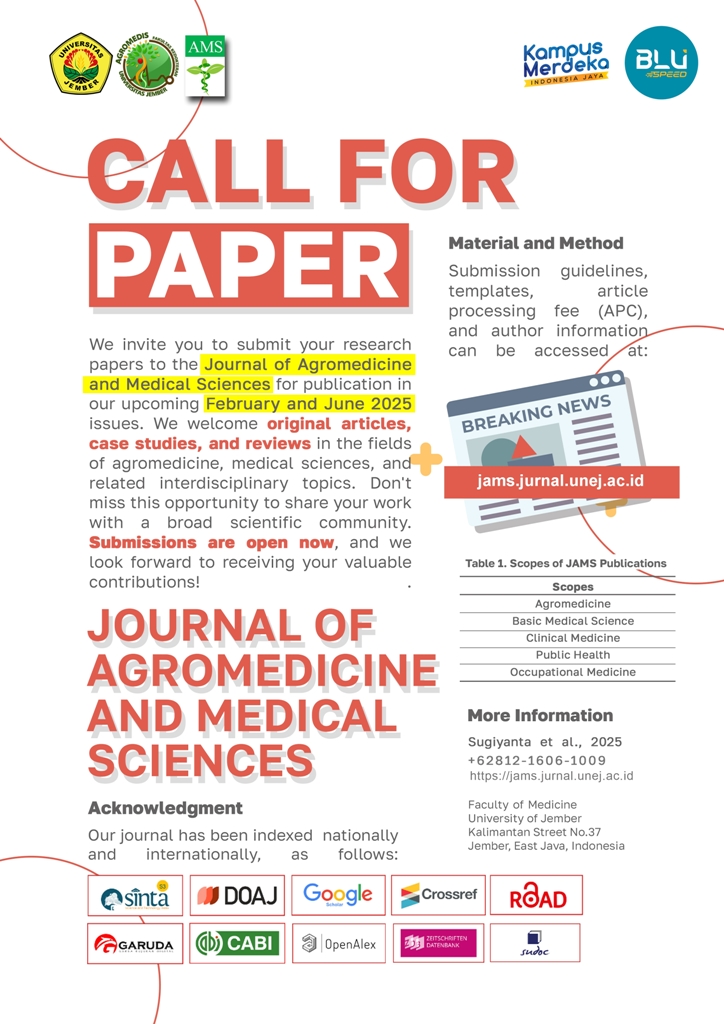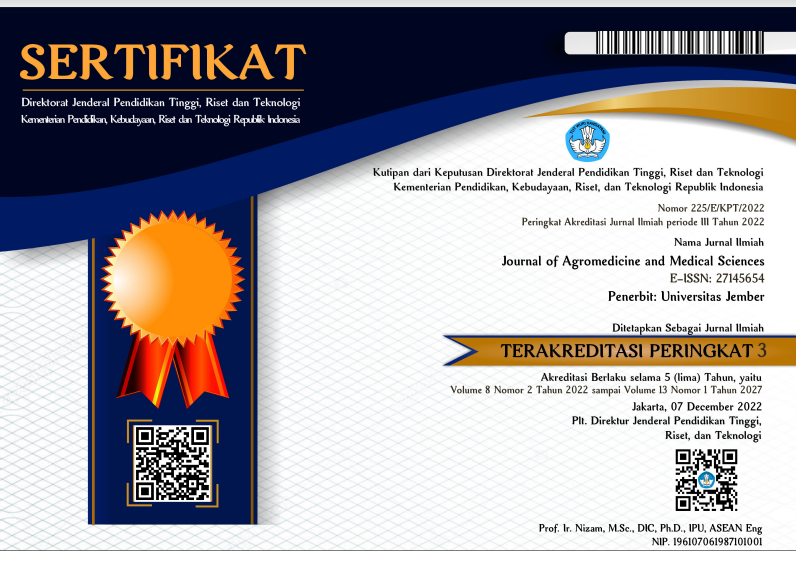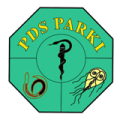Factors Affecting Patterns of Fast Food Consumption in Students of Medical Study Program Faculty of Medicine Tanjungpura University
DOI:
https://doi.org/10.19184/ams.v9i3.41505Abstract
Medical students who are in their late teens and are affected by high stress due to academic loads experience changes in nutritional intake behavior, namely changes in eating patterns with a tendency to consume fast food (fast food). The purpose of this study was to determine the factors that influence fast food consumption patterns in students of the Medical Study Program, Faculty of Medicine, Tanjungpura University. This study uses a type of observational analytic research with a cross-sectional design. This study used data on weight and height measurements, a 3x24-hour Food Record, and a questionnaire on 46 students of the Medical Study Program class of 2022. The results showed low consumption of calories, protein and carbohydrates, and high consumption of fat. The overall average intake of energy, fat and carbohydrates is normal, while protein intake is low. There is no effect of all variables on consumption of energy, protein, fat, carbohydrates, and nutritional status. However, action on fast food has a significant effect on energy consumption. Students often consume fast food which is processed by frying process. Low protein intake and high fat consumption indicate the need for education for food selection in reducing the negative impact on the health of medical students.
Keywords: Fast food, medical students, consumption patterns, factors
Downloads
References
AlJaber, M. I., Alwehaibi, A. I., Algaeed, H. A., Arafah, A. M., & Binsebayel, O. A. (2019). Effect of Academic Stressors on Eating Habits Among Medical Students in Riyadh, Saudi Arabia. Effect of Academic Stressor on Eating Habits Among Medical Students in Riyadh, Saudi Arabia, 8(2), 390–400. https://doi.org/10.4103/jfmpc.jfmpc
Arip, M. (2020). Perilaku Pencegahan Penyakit Tidak Menular Pada Remaja Ambon. Jurnal Keperawatan Terpadu, 2(1). e-issn: 2685-0710
Ariyana, D., & Astiningsih, N. W. W. (2020). Hubungan Pengetahuan dengan Kebiasaan Konsumsi Makanan Cepat Saji (Fast Food) pada Siswa-Siswi Kelas XI di SMA Negeri Samarinda. Borneo Student Research, 1(3), 1841–1846.
Direktorat Pengendalian Penyakit Tidak Menular, Direktorat Jenderal Pengendalian Penyakit dan Penyehatan Lingkungan, & Kementerian Kesehatan Republik Indonesia. (2016). Pencegahan dan Pengendalian Penyakit Tidak Menular di Indonesia.
Dowarah, L. J., Bhowmick, D. R., & Chakraborty, S. (2020). Fast food consumption behaviour among college students-a case study in tinsukia. Current Research in Nutrition and Food Science, 8(2), 371–379. https://doi.org/10.12944/CRNFSJ.8.2.02
Ferdianti, L. (2021). Hubungan Aktivitas Fisik dan Kebiasaan Konsumsi Fast Food dengan Kejadian Obesitas Pada Anak Sekolah Dasar. Media Kesehatan Masyarakat Indonesia, 20(2), 139–143. https://doi.org/https://doi.org/10.14710/mkmi.20.2.139-143
Handalan, A. Z., Arundina, A. T., & Fitrianingrum, I. (2022). Hubungan Tingkat Stres dengan Konsumsi Junk Food melalui Pemesanan Daring pada Mahasiswa Fakultas Kedokteran. Majalah Kedokteran Andalas, 45(3), 334–347. http://jurnalmka.fk.unand.ac.id
Iis Sopiah Suryani, Meti Sulastri, H. (2020). Hubungan Konsumsi Junk Food Dengan Status Gizi Pada Remaja Di Sekolah Menengah Pertama “S.†4(1), 1–23. e-issn: 2615-1987
Kemenkes RI. (2018). Hasil Riset Kesehatan Dasar Tahun 2018. Kementrian Kesehatan RI, 53(9), 1689–1699.
Kurniasanti, P. (2020). Hubungan Asupan Energi, Lemak, Serat, dan Aktivitas Fisik dengan Visceral Fat pada Pegawai Uin Walisongo Semarang. Jurnal Gizi, Pangan Dan Aplikasinya, 4(2), 139–152. https://doi.org/https://doi.org/10.21580/ns.2020.4.2.7150
Legiran, Azis, M. Z., & Bellinawati, N. (2015). Faktor Risiko Stres dan Perbedaannya pada Mahasiswa Berbagai Angkatan di Fakultas Kedokteran Universitas Muhammadiyah Palembang. 2(2), 197–202. https://doi.org/10.1063/1.3106611
Mawitjere, M. C., Amisi, M. D., & Sanggelorang, Y. (2021). Gambaran Asupan Zat Gizi Makro Mahasiswa Semester IV Fakultas Kesehatan Masyarakat Universitas Sam Ratulangi Saat Pembatasan Sosial Masa Pandemi COVID-19. Jurnal KESMAS, 10(2), 1–11.
Nurliesa, M. W. (2021). Hubungan Frekuensi Konsumsi Junk Food Melalui Pemesanan Makanan Secara Daring Dan Aktivitas Fisik Dengan Status Gizi Pada Mahasiswa Fakultas Kedokteran Universitas Tanjungpura [Universitas Tanjungpura]. https://doi.org/https://doi.org/10.25077/mka.v46.i1.p68-78.2023
Samingan, S., Azwalika, Z., & Octaviani, O. (2021). Determinan Perilaku Konsumsi Makanan Siap Saji (Fast Food) Pada Siswa di SMA Negeri X Jakarta Timur Tahun 2020. Jurnal Bidang Ilmu Kesehatan, 11(2), 136–145. https://doi.org/10.52643/jbik.v11i2.1829
Satrianugraha, M. D. (2022). Hubungan Intensitas Penggunaan Layanan Pesan Antar Terhadap Kejadian Gizi Lebih Pada Mahasiswa Kedokteran. Jurnal Signal, 10(2). http://jurnal.ugj.ac.id/index.php/Signal
Siti Ainun Muti’ah Binti Azman. (2020). Knowledge, Attitude and Practice on Fast Food Consumption Among Normal and Overweight/Obese International Islamic University Malaysia Kuantan Students. International Islamic University Malaysia, 4(3), 1199. https://journals.iium.edu.my/ijahs/index.php/IJAHS/article/view/479
Sudayasa, I. P., Rahman, M. F., Eso, A., Jamaluddin, J., Parawansah, P., Alifariki, L. O., Arimaswati, A., & Kholidha, A. N. (2020). Deteksi Dini Faktor Risiko Penyakit Tidak Menular Pada Masyarakat Desa Andepali Kecamatan Sampara Kabupaten Konawe. Journal of Community Engagement in Health, 3(1), 60–66. https://doi.org/10.30994/jceh.v3i1.37
Tangkilisan, G. P., Handayani, F., Suarayasa, K., & Fitriana, Y. (2022). Perilaku Konsumsi Garam Dan Gula Pada Mahasiswa Fakultas Kedokteran Universitas Tadulako Angkatan 2020. SEHATMAS: Jurnal Ilmiah Kesehatan Masyarakat, 1(1), 71–82. https://doi.org/10.55123/sehatmas.v1i1.45
Tanjung, N. U., Amira, A. P., Muthmainah, N., Program, S. R., Ilmu, S., Masyarakat, K., Utara, S., & Abstrak, M. (2022). Junk Food dan Kaitannya dengan Kejadian Gizi Lebih Pada Remaja. Jurnal Ilmiah Kesehatan Masyarakat, 14(3), 133–140. issn: 20854366
Ufrida, K., & Harianto, S. (2022). Konsumerisme Makanan Siap Saji Sebagai Gaya Hidup Remaja di Kota Surabaya: Studi Kasus Siswi SMA Muhammadiyah 4 Kota Surabaya. Jurnal Analisa Sosiologi, 11(1), 137–156. e-issn: 2615-0778
Wicaksono, O. N. R. P. (2021). Pola Konsumsi Junk Food Pada Remaja Di Kota Bekasi. 1–4. https://ereport.ipb.ac.id/id/eprint/6418/1/J3F118077-01-Olyvia Wicaksono-Cover.pdf
Widyastari, H., & Setiowati, A. (2015). Pengaruh Status Gizi, Tingkat Konsumsi Energi dan Protein terhadap VO2 Maks. Jurnal Media Ilmu Keolahragaan Indonesia, 5(2), 46–50. https://doi.org/https://doi.org/10.15294/miki.v5i2.7893
Wilksch, M., O’Shea, A., Ho, P., & Byrne, S. (2019). The Relationship Between Social Media Use and Disordered Eating in Young Adolescents. International Journal of Eating Disorders, 53(1), 96–106. https://doi.org/https://doi.org/10.1002/eat.23198























